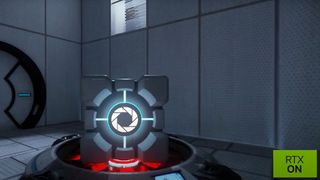Portal is getting a full Nvidia RTX overhaul mod
Omniverse is making modding pretty simple, so here's Portal with RTX, for reasons.

You didn't know you needed it, but Portal is going RTX on. That's just one of many juicy announcements coming from Nvidia's keynote today. Why the company has decided to revive an 15-year-old game with ray tracing may not be clear at first, but what we're really seeing here is a shift of focus, to make modding a much more accessible hobby for the average gamer.

"Nine of the ten most popular competitive games owe their existence to mods," Jen-Hsun says. In order to accommodate the thousands of modders working away on improving the graphics of already established games, Nvidia has now announced RTX Remix. It's an Nvidia Omniverse tool that seems almost like magic to an ex-environment art student like myself.
Apparently, it's as simple as this: "Start the game, and capture the game into USD, which is loaded into Omniverse." In case you're wondering, USD stands for Pixar Univeral Scene Description.
That's exactly how Portal RTX is being delivered, and I have to say it's looking stunning. They even showed the tool working to improve the look of Morrowind, which is a feat in and of itself.
Alongside a small teaser for the upcoming RTX 4090, CEO Jen-Hsun Huang also gave us the rundown on an improved version of Nvidia's deep learning super sampling tech, in the form of DLSS 3.
Combining the upcoming flagship 40-series GPU with Nvidia DLSS 3 tech, Jen-Hsun assures us we'll see the Portal RTX mod running three times faster than we'd see it on the RTX 3090 Ti. Though we've not seen it running on the RTX 3090 Ti yet, so we can't give you any exact numbers.
Either way, it looks like it might be time for a cheeky replay of a 2007 Valve classic, then. This time, in some impressively implemented ray tracing glory.
The biggest gaming news, reviews and hardware deals
Keep up to date with the most important stories and the best deals, as picked by the PC Gamer team.

Screw sports, Katie would rather watch Intel, AMD and Nvidia go at it. Having been obsessed with computers and graphics for three long decades, she took Game Art and Design up to Masters level at uni, and has been rambling about games, tech and science—rather sarcastically—for four years since. She can be found admiring technological advancements, scrambling for scintillating Raspberry Pi projects, preaching cybersecurity awareness, sighing over semiconductors, and gawping at the latest GPU upgrades. Right now she's waiting patiently for her chance to upload her consciousness into the cloud.
Most Popular







